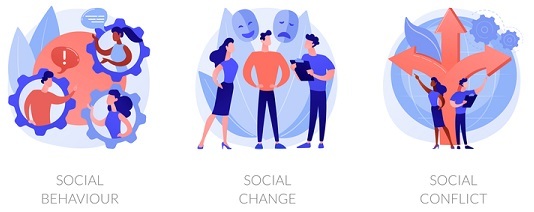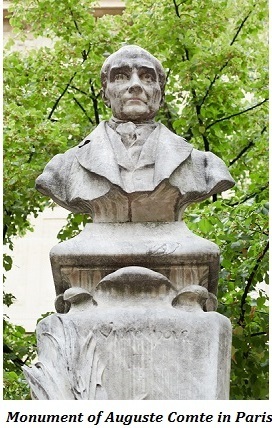

Like nature, every society changes. It is a universal occurrence which is not uniform. There can be different forms of social change. If some social changes can be legal or technological, some can also be psychological. With this idea in mind, the article will discuss various theories and aspects related to social change.

Society consists of various institutions. Certain external and internal factors bring changes to these institutions, which in turn bring major or minor changes in society. This can be referred to as social change. Changes in society impact social relationships and change the terms of social organisations. This may ultimately bring changes in the social structure.
Sociological theories on social change have been largely classified into four categories −

Classical Evolutionary theory on social change believed that societies evolve from simple forms to more complex forms with time.
Sociologists who fall into this category of belief include Auguste Comte, L H Morgan and Herbert Spencer. Comte believed that society evolves from the theological stage to the metaphysical stage to the positive stage.
According to L H Morgan, societies evolve from savagery to barbarism and then to civilization.
Spencer believed in the cosmic law of evolution, which involves the differentiation of various aspects of society followed by continuous integration of these aspects. Here, differentiation can occur in the form of a division of labour in society due to many internal or external factors of change. Hence, continuous methods of integration would be necessary to maintain society. Spencer’s idea of social change was influenced by the idea of organic analogy in biology. This led him to believe that like every organism, society also consists of various interdependent parts (various social institutions) which cause social change. As the size of society increases, it leads to more differentiation followed by increased integration. Society according to Spencer evolves in various stages, starting from simple society to compound society to doubly compound society to trebly compound society.
Cyclical theories on social change seek to study the growth and downfall of a society or civilization. Sociologists who propagated this theory are Sorokin, Toynbee and Spengler. According to Sorokin, a small cultural change in a society brings changes to the entire society. Sorokin’s book “Socio-Cultural Dynamics” classifies three kinds of culture. These include sensate, idealistic and ideational cultures. Toynbee in his book named “A study of History” talked about the challenges a society faces and its consecutive responses which lead to social change. Spengler studied eight civilizations and believed destiny places a role in social change. For him, modern western societies are in their last stage of evolution which means they are soon to decay due to conflicts, war, aggression or social conflicts.
Conflict theory on Change: Karl Marx is one of the propounders of this theory. According to this theory, society is unequal due to constant competition. Marx believed that the bourgeoisie owned the means of production, ruled the society and exploited the proletariat economically.
The structural-functional theory of change focuses on the role of social institutions, their organisation and activities that lead to change. Emily Durkheim is one of the leading exponents of this theory. Functionalists pay attention to the stability and unity of various aspects of society to understand the change dynamics.
There can be external and internal factors that trigger social change.
External factors are mostly indirect.
These include cultural exchange among societies due to the migration of people from one place to another.
Internal factors are aspects that are present within a society or are an integral part of the society.
These may include changes in population, industrialization, technological advancements, environmental changes, internal conflicts, etc.
Internal factors bring direct changes in society.
In 1960 Interracial marriage became legal in the US. Only 20% of Americans supported this move, but as time passed, 1997 recorded the highest support for interracial marriage for the first time in the US. Since then, acceptance has been increasing.
The feminist movement has brought major changes in the society and mindset of people. It has given women equal rights to vote and changed workplace rules to provide women equal opportunities and equal pay in many places.
If directed positively, social change can lead to human progress and sustainability.
Human conditions can be improved through innovation and structural, functional changes in nation-states.
With better technology and governance, environmental depletion can be checked, and sustainable growth can be ensured.
Relations among nations could be improved through better cooperation and negotiations, leading to the development of friendly allies and a better world.
Such associations could improve the working conditions of people, empower minorities and restore democratic administration wherever necessary.
This can help in fostering healthy Interpersonal relationships in society, leading ultimately to a safe and positive environment for future generations.
Social change can be of various kinds. Positive social changes encourage gender equality. It helps in designing better plans for the welfare of the citizens. It empowers citizens of all strata and also makes the government accountable to the people. Educational institutions in a society are great places to trigger positive social change.
Q1. What is understood by the diffusionist theory of change?
Ans. Diffusionist theory of change focuses on external factors of social change. They believe that sources of change outside the society also bring social change. Hence, they focus on cultural exchange between societies.
Q2. Who divides the social system into ‘elite’ and ‘masses’?
Ans. Vilfredo Pareto divided the social systems into ‘elite’ and ‘masses’. Here, ‘elites’ consist of people who govern the society and ‘masses’ are referred to people who are governed by the elites.
Q3. What is the ideational cultural stage?
Ans. According to Sorokin’s idea of the ideational cultural stage, during this stage people in society focus on ideas like truth, and peace in life. Here, spirituality takes a centre stage in the sense that social stratification occurs based on spiritual success and achievements.